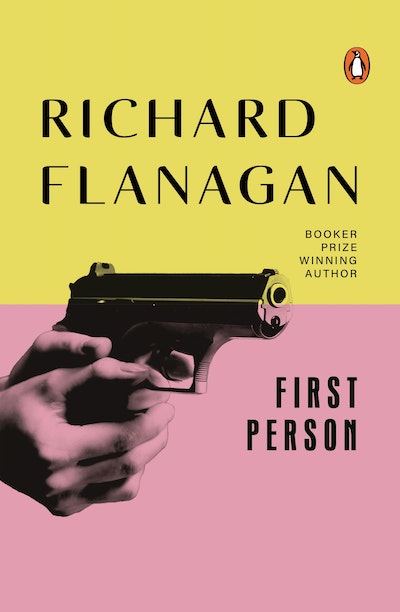- Published: 16 May 2023
- ISBN: 9781761048128
- Imprint: Penguin
- Format: Paperback
- Pages: 400
- RRP: $28.00
First Person
Extract
Our first battle was birth. I wanted it in, he wanted it out. All that day and half of the next we argued. He said it had nothing to do with him. Later I began to see his point, but at the time it seemed bloody-mindedness and evidence of an inexplicable obstruction—as though he didn’t actually want any memoir ever written. Of course, he didn’t want a memoir written, but that wasn’t his point. Or the point. But I only realised this later, much later, when I came to fear that the beginning of that book was also the end of me.
Too late, in other words.
These days I content myself with reality TV. There is a void, a loneliness that aches and rattles. That frightens. That terrifies me that I should have lived and never did. Reality TV doesn’t have this effect on me.
Back then though, all this was confusing. It was feared by others that I might relapse into literature. By which I mean allegory, symbol, the tropes of time dancing; of books that didn’t have a particular beginning or end, or at least not in that order. By whom I mean the publisher, a man by the unexpected name of Gene Paley. He had been quite specific in this regard: I was to tell a simple story simply, and where it was not simple—when it dealt with the complexities of the spectacular crime—simplify, illustrate by way of anecdote, and never have a sentence that lingered longer than two lines.
It was whispered around the publishing house that Gene Paley was frightened of literature. And not without good reason. For one thing, it doesn’t sell. For another, it can fairly be said that it asks questions that it can’t answer. It astonishes people with themselves, which, on balance, is rarely a good thing. It reminds them that the business of life is failure, and that the failure to know this is true ignorance. Maybe there is transcendence in all this, or wisdom in some of it, but Gene Paley didn’t see himself in the transcendence game. Gene Paley was all for books telling you one or two things over and over again. But preferably only one.
Selling, Gene Paley would say, is telling.
I opened the manuscript again and re-read the opening lines.
On 17 May 1983, I signed my application letter for the position of Acting Safety Officer (supervisor) (Acting Class 4/5) at the Australian Safety Organisation, with two words, Siegfried Heidl, and my new life began.
Only much later did I discover that Siegfried Heidl had never existed until that day he signed the letter, so—strictly speaking— it was an honest account. But the past is always unpredictable and, as I was to learn, not his least gift as a con man was that he rarely lied.
Ziggy Heidl’s point of view was that his twelve-thousand-word manuscript—the thin pile of stacked papers on which he would frequently press down with his outstretched hand as if it were a basketball to be bounced and put back into play—said everything that anyone would ever be interested in reading about Ziggy Heidl. My job as a writer, he went on, was simply to sharpen his sentences, and perhaps elaborate here and there a little on his account.
He said this, as he said so much else, with such belief, with such confidence and such conviction, that I found it very difficult to point out, as I had to, that his manuscript made no mention of his childhood, his parents or even, for that matter, his year of birth. His reply has remained with me, even after all these years.
A life isn’t an onion to be peeled, a palimpsest to be scraped back to some original, truer meaning. It’s an invention that never ends.
And when I must have looked struck by his elaborate turn of phrase, Heidl added, as if giving directions to a public toilet: Tebbe. It’s one of his aphorisms.
What he lacked in facts, he made up for with an understated conviction; and what he lacked in conviction he made up for with facts, albeit mostly invented, and rendered all the more plausible because they were so lightly thrown up from an unexpected angle.
The great German installationist, Heidl said. Tomas Tebbe.
I had no idea what a palimpsest might be. Or who Tebbe was, or what an installationist did, or was, and said so. Heidl made no reply. Maybe, as he told me another time, we take from our past and the past of others to make ourselves anew, and the something new is our memory too. Tebbe, whom I only read many years later, put it best: It may be someone else’s blood soaking into the dust, he wrote, but I am that dust.
I looked up.
Out of interest, I said, whereabouts in Germany did you grow up?
Germany? Ziggy Heidl said, looking out the window. I never went there until I was twenty-six. I told you. I grew up in South Australia.
Your accent is German.
Roger that, Ziggy Heidl said. And when he turned his fleshy face back to me I tried not to stare at the small muscle in his otherwise puffy cheek that twitched when he smiled, a knot of tautness amidst the slackness, a single tight muscle pulsing in and out.
I know it’s odd, but there you are—I grew up with German-speaking parents and no one to play with. But I was happy. Write that.
He was smiling.
His smile: an undertow of sinister complicity.
What? I said.
That.
What?
Write: I was happy.
That terrible smile. That twitching cheek.
Boom-boom, it silently went. Boom-boom.











